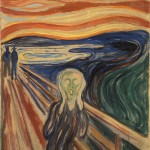
Music is all about emotions. Composers know how to evoke emotions through their intuition. However, emotions range from the positive feeling of happiness to fear and panic on the negative scale. Music can scare! The frightening effect of music brings the feeling of suspense and enriches our emotional experiences. The best example is the use of music in film industry, the famous shower scene in a Hitchcock thriller “Psycho”. Listening to this video scares. You can try it with and without sound. The impact is big! We hear much dissonance. But why do these simple musical tones have such a scaring effect on listeners?
Scientists came up with a conclusion: dissonant harsh sounds can invoke a deeply ingrained instinctive response. There is a connection between the suspense music and the screeches of frightened baby animals in distress. The Amygdala – almond-shaped structure in our brain is responsible for figuring out where we should be afraid of something. If the answer is yes, it fires all signals getting the body ready to run or fight. It is a natural biological reaction.
Daniel Blumstein is a leading scientist on this study and he is an expert on animal distress calls. He analyzed the link between screeches of different animals and soundtracks from movies. He also found that when the melodies suddenly became higher, there was greater emotional stimulations than in the moments when the notes went lower. It is also connected to the fact that when we are frightened, our voices get higher due to more tension in the vocal cords. Apparently, visual stimuli dominate the audio stimuli, so the effect would not work if we pair the harsh dissonant music with pictures of fluffy teddy bears.
It is interesting that music theorists in the Middle Ages suggested to composers to avoid certain combinations of notes like the triton (two notes with three whole steps apart like F and B) so as not evoke negative emotions. This triton was even called devil in music (Diabolus in musica).
Researchers also agree that the music mostly becomes emotionally colored through context and associations. It makes me think of Requiem and Dies Ira (Day of Wrath) – the lyrics of the catholic mass remind us of the terrible Judgement day and composers like Mozart and Verdi knew how to make this movement sound really strong and frightening. There are examples by Modest Mussorgsky “Songs and Dances of Death”, Danse Macabre by Camille Saint-Sans, “Dance of Death” by Franz Liszt – there was a macabre fascination by fear of hell. In contrast, the music of Johann Sebastian Bach „Toccata and Fugue in D-minor,” did not sound scary until it was used in movie like “Dr. Jekyll and Mr. Hyde”.
Some music techniques like speeding up or growing louder could help our imagination to feel the danger or hint that a character is being chased. The use of dissonant tones, the jerky sounds that come and go abruptly, much percussion, high-pitch disturbing sounds bring the feeling of fear into the music. Changing dynamics and the deliberately chaotic structure of the piece can send the chills down our spine. The rhythm is very important – it is associated with the footsteps, ticking clock, heartbeat, breathing you name it! Hearing unfamiliar strange sounds can also sound very weird. So many composers use unusual instruments or play instruments in unusual ways. It makes me think of John Cage or George Crumb and their compositions for prepared piano.
These days we have sound designers whose job would be to create new sound combinations to serve the purpose.
Have you experienced the music compositions that would make us scared? How did you feel? Thank you for sharing your views! Looking forward to hearing your opinion and feedback!
Von Edvard Munch – Google Art Project: pic, Gemeinfrei, https://commons.wikimedia.org/w/index.php?curid=37624942